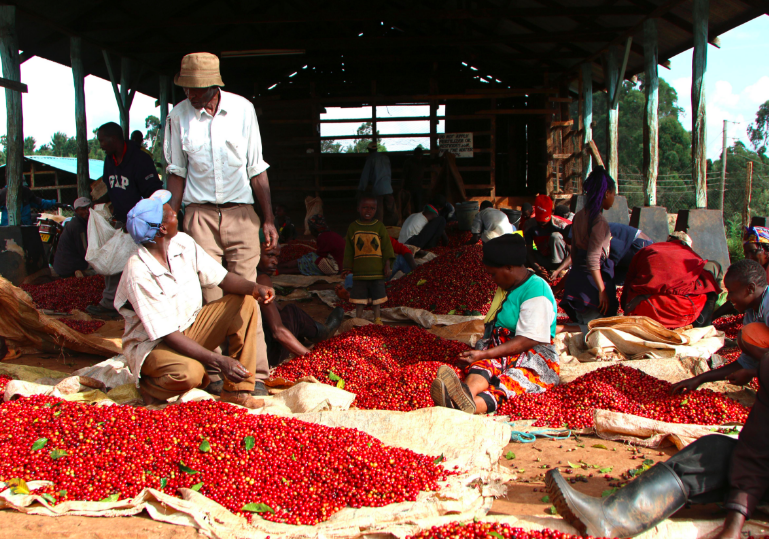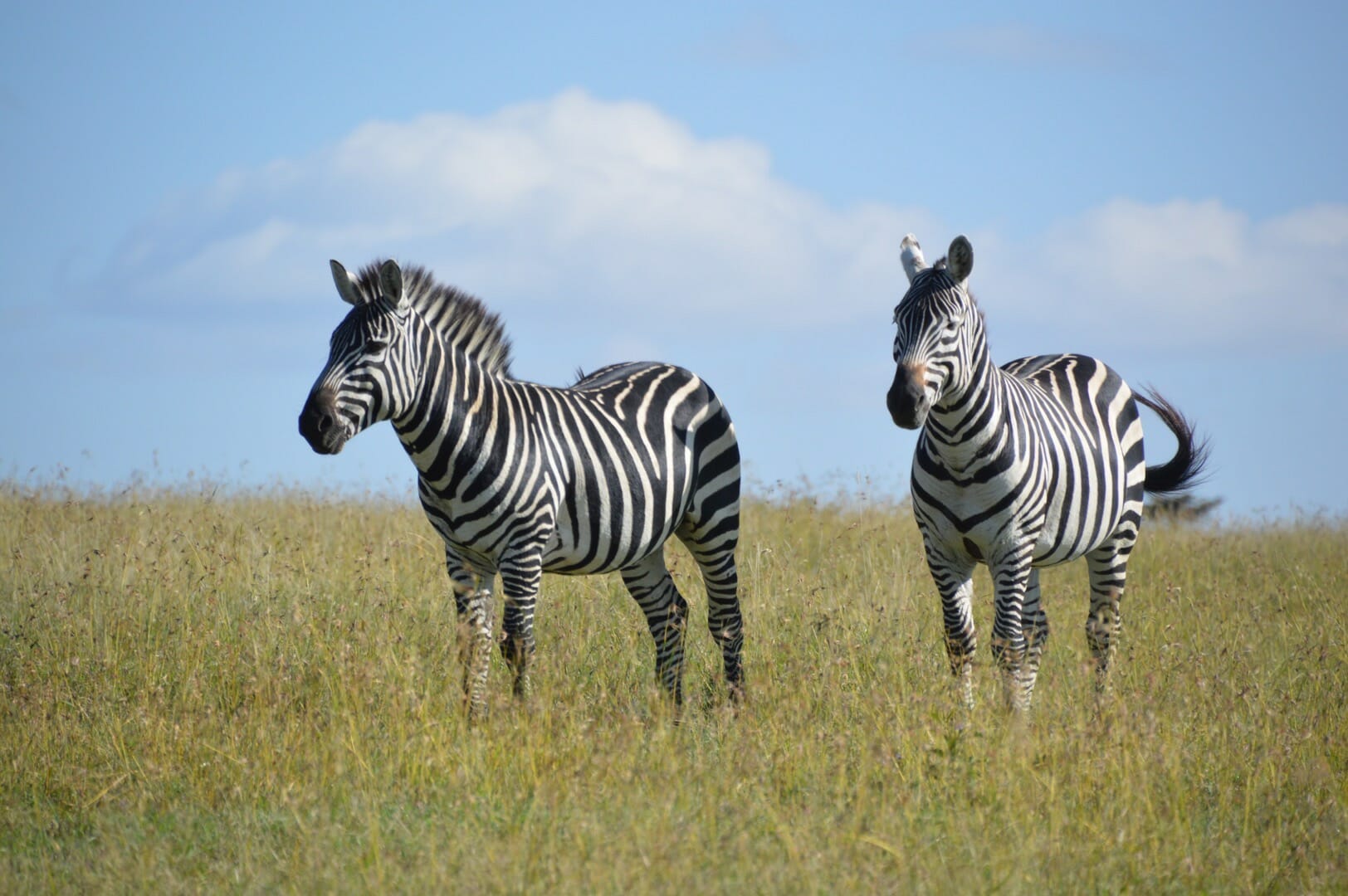Kenya is considered one of the elite coffee growing regions in the world, with a coffee producing infrastructure second to none. ‘Complex’ and ‘dynamic’ are some of our favorite ways to describe Kenyan coffee, due in part to the types of coffee plants that are grown and unique processing techniques employed here. Fruity notes of blackberries and dried fruits are quite common for Kenyan coffees, as well as an intense bittersweet acidity, often reminiscent of grapefruit.
Small-holder farmers grow coffee cherries on small parcels of land, which they sell to local cooperatives or washing stations. At the washing stations, called ‘factories’, harvests are pooled from hundreds of local farmers and separated into separate lots based on the size of the coffee beans. Coffee beans are sorted by a series of screens that act as a strainer, beans that are too large to fall through the holes will remain while the smaller beans will continue to drop through the various levels. Based on these ‘screen sizes’ they are separated by grade, like AA, AB, or PB (Peaberry). As this system is designed to sort coffee by size, it is not a strict standard of quality, i.e., AA is not necessarily better than AB.

Kenyan Coffee Quality
Kenya is also distinctly known for the varieties they grow, most notably SL-28 and SL-34. The SL types are coffee varieties that Scott Labs released in the 1930s after years of experimentation and genetic testing, specifically aimed to be high yielding and drought resistant coffee plants. While the coffee trees don’t produce as much coffee as they originally intended, these varieties are loved and revered for creating extremely high quality and delicious coffee. You are also likely to see varieties like Ruiru 11, French Mission, K7, and Batian in coffees that come from Kenya. Other producing countries are now starting to experiment with growing the Scott Labs types to see how the variety affects cup quality and flavor development when grown in different origins.

The Habitat
The soil, climate, coffee varieties, farming practices, and processing all contribute to the distinctive flavor profile of Kenyan coffee that is unlike anything else in the world. These coffees have trademark complex flavor profile of dark fruit notes, like blackberries, dried fruit notes like raisins, currants and dates, and often have complex acidity of citrus, often pronounced as grapefruit. Fruits are not the only flavors found in these coffees, as they can often have notes of spices, bittersweet chocolate, and even a savory quality that reminds us of a ripe tomato or herbs. Aside from interesting flavors, coffees from Kenya have a distinctive body and mouthfeel that is often described as syrupy or juicy.

Our Favorite Kenyan Coffees
Right now, coffees from Kenya are in their peak of the season and we’ve got some great new offerings that we think you should try.
Kenya Ndaroini – Andrew Heppner and his team at Populace Coffee Co. always have something brewing – from blind tasting coffee competitions to a magazine about Specialty Coffee culture. When they aren’t busy making waves in the industry, they are buying and roasting some really incredible coffees. In this case, the Ndaroini lot was grown by group of farmers in the central part of Kenya called Nyeri County and was harvested between the months of October and December in 2015 before being washed and dried. This is a fantastic coffee that has everything we look for in a classic Kenyan cup profile; dark fruit notes of currants and cherries with a caramelized sweetness of toasted sugar.
Kenya Kiamaina – Greenway Coffee Company is one of the newest additions to our lineup and we couldn’t be more excited. This is a brand new Kenyan coffee that stunned us with how delicious it was. A fully washed coffee also from Nyeri County, it has a unique flavor profile we haven’t often experienced with coffees from this area. While it carries a bittersweet note of baker’s chocolate, the acidity is where this coffees shines. It has a juicy kiwi note accompanied by mandarin orange – honestly, you might have to drink this coffee a few times before you are able to dig into all of the nuanced flavors in there.
Kenya Karindundu – With all of the complexities in the cup, Kenyan coffees can sometimes be difficult to dial in the perfect roast to make sure the best possible flavors are shining through. With Case Coffee Roasters, we never have to worry about that. Year after year, Tim and Kati Case buy stellar lots, particularly from Kenya, and we’re always excited to taste what they’ve got. The Karindundu is a AA screen size coffee, yet again from the Nyeri region, and was grown by a group of 821 small-holder producers. As we mentioned earlier, Kenyan coffees can range quite a bit in flavors – but this one takes it to the extreme. Bright, syrupy notes of tropical fruit are the star in this coffee. With tasting notes of pineapple juice and passionfruit, this coffee could be an ingredient in a Tiki drink and we wouldn’t complain. Or maybe instead of a Tiki cocktail, make this a flash chilled iced coffee and go crazy with the garnishes.
Kenya Gathiruini AB – Last but certainly not least, Tandem Coffee Roasters from Portland, Maine regularly wows us with their incredible tasty coffees. Kiambu County lies to the south of Nyeri and resides just north of the city of Nairobi. This coffee, from Kiambu, is comprised of the SL-28 and SL-34 varieties that are so dearly loved and prized. The dark fruit notes of this coffee pronounce themselves as cranberry and concord grape. As the initial wave of fruit notes settles, a big sweet caramel body complemented by cinnamon spice lingers on the palate.
With all of these incredibly delicious coffees from Kenya in season, it’s impossible to pick a favorite. Let us know if you want to try one of these coffees in your next shipment!
**Check out our awesome coffee cocktail article and the perfect cold brew cup!
